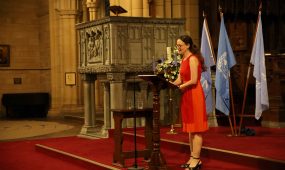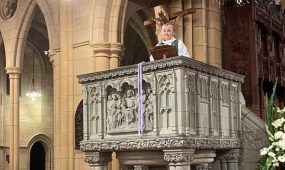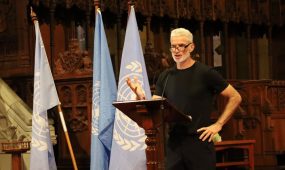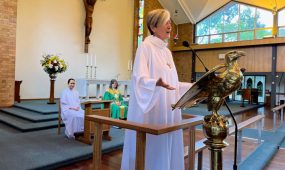“Remember that everyone belongs”
Homilies & Addresses
Director of Mission at Anglicare, The Rev’d Canon Linda McWilliam reflected on the importance of valuing cultural and religious diversity in her recent Harmony Day address
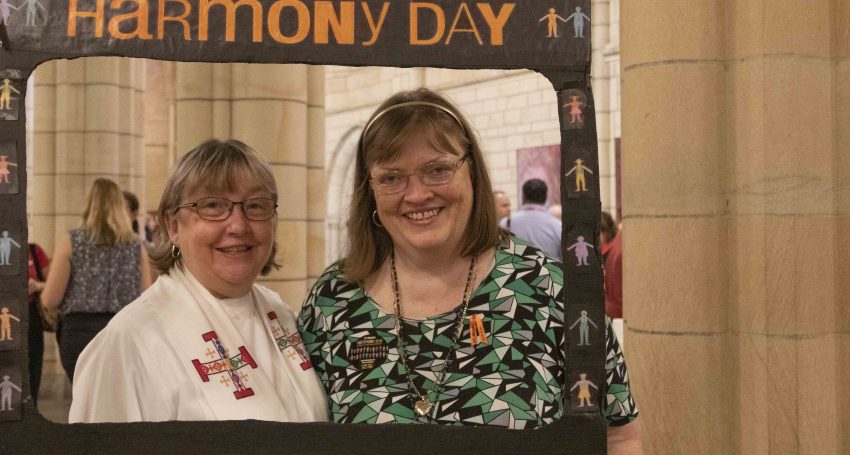
Today we have come to celebrate Harmony Day. Karen mentioned in her introduction the devastating terrorist attack in Christchurch last week and how important it is that we as a nation much reach out to each other and spread the message of peace, harmony and belonging through both our thoughts and our actions. The message of Harmony Day is ‘everyone belongs’. It’s a day in which we celebrate our cultural diversity – it’s a day of cultural respect for everyone who calls Australia home. The purpose of Harmony Day is to encourage people to participate in their community, respect cultural and religious diversity, and foster a sense of belonging for everyone.
Australia is a vibrant and multicultural country and one of the most successful multicultural countries in the world. I believe that our cultural diversity is one of our greatest strengths and is an integral part of our national identity. It is at the heart of who we are. It makes Australia a great place to live. People who have come to Australia from other countries bring with them some of their own rich cultural and religious traditions, and these traditions have greatly enriched our nation.
Regrettably we still have some way to go before our societies will experience complete harmony. There are many things that still divide us. Deeply rooted suspicions and prejudices remain. Too often we hear people talk in ways or do things that denigrate others. Building strong and harmonious cross-cultural relationships is a challenge for all of us as individuals, as a church and as a nation.
In the ancient world, people were homogenous; they shared the same culture and faith and belonged to the same tribe. Unity was synonymous with uniformity. The community established the rules, and to be part of that community, people had to abide by the rules. In our world today, in the wake of globalisation and mass migration, the world is no longer homogenous. People of different cultures, races, languages and faiths are all living in the same place. Unity cannot be based purely on uniformity. Genuine unity must be founded in diversity.
Advertisement
Dialogue is so important in seeking to understand and appreciate each other. If we genuinely want to get to know each other, we need to spend time together. We need to be generous in offering hospitality to each other. We have some great food to share. I can still remember when I first experienced food from a different culture. It was Italian spaghetti with parmesan cheese. I have never forgotten the delightful taste of that spaghetti and cheese. And now there are so many wonderful foods to be enjoyed from so many different cultures. As Karen said, we need to be curious and explore each other’s culture and traditions. I think that is when each of us begin to feel a sense of belonging.
In the midst of conflict and division, cultures and religions must come together to promote peace and unity. Reciprocal dialogue and tolerance are essential in seeking to alleviate inequality, injustice and racism. When there is love among peoples of different religions, there will be no hatred, extremism and terrorism. Saint John says “Whoever does not love does not know God, for God is love. (1 John 4:8)” All religions promote love and peace. As faith believers, we are all called to be instruments of God’s love and harmony. We are called to work together to promote justice and free the world from racism, intolerance and violence.
Advertisement
Most of us have grown up with the narrative that Australia is the ‘lucky country’. People believe it is a privilege to come here and to live here. I imagine that is how people feel about living in a beautiful country such as New Zealand. I personally have found myself rather overwhelmed by the horrific atrocity and loss of innocent lives that we have all seen played out in Christchurch. May I share with you what has helped to sustain me during this terrible time of disbelief and horror.
I personally found the compassionate and courageous response of New Zealand’s Prime Minister Jacinda Ardern very healing and reassuring. She described Friday’s mass shootings at the two mosques in the city of Christchurch as “one of New Zealand’s darkest days.” She questioned “how this could have happened here, we – New Zealand – we were not a target because we are a safe harbour for those who hate. We were not chosen for this act of violence because we condone racism, because we are an enclave for extremism. We were chosen for the very fact that we are none of these things. Because we represent diversity, kindness, compassion, a home for those who share our values, refuge for those who need it. And those values, I can assure you, will not, and cannot, be shaken by this attack. We are a proud nation of more than 200 ethnicities, 160 languages. And amongst that diversity we share common values. And the one that we place the currency on right now – and tonight – is our compassion and support for the community of those directly affected by this tragedy. And secondly, the strongest possible condemnation of the ideology of the people who did this. You may have chosen us – but we utterly reject and condemn you”.
I also found watching students from across the city of Christchurch gather for a vigil in honour of those who were killed or injured in the mosque shootings, moved me greatly. Thousands of students came together to chant kara/kia, Maori prayers, and to sing a wai/ata, or mourning song, before performing an emotional haka. Those examples are just two of the many compassionate responses we have seen and heard from people and various communities. All of this helps me to know and remember that God is at work in the world in the midst of the pain and suffering.
The Christian faith calls us to a way of being and living in the world that demonstrates respect for all people regardless of their background and faith. Jesus Christ in his life and ministry made clear for us the responsibility we have to recognise and embrace the differences between and among human beings. We are called to follow and live out God’s will for reconciliation in the world. Reconciliation between people here in Australia hangs on our understanding and acceptance of our country as a multi-faith and multicultural society. As a nation it requires us to work hard for an end to the violence of racism and prejudice. Ultimately what we strive for is a just society built on mutual respect, which values and celebrates the gifts of our diversity.
In today’s Psalm, the writer paints a beautiful picture of Aaron, the high priest and brother of Moses. He pictures unity being poured over Aaron’s head, flowing sweetly and smoothly, fragrantly down his face, through his beard, all the way to the hem of his priestly garments. Unity is the glue that hold a family, a church, a nation together. Psalm 133 extols the value of unity. The result of such harmony is a place where God’s people are refreshed and strengthened by God’s Spirit – just as the dew nourishes the dry ground. It is the place where God commands blessing and where God’s anointing flows.
People who are divided and estranged from one another need God’s call to live together in unity. For them, this Psalm offers hope and the promise of kinship in Christ. Although it is brief, it is also one of the most beautiful descriptions of Christian unity that has ever been written. Our diversity is meant to make Australia a great place to live.
We must resist attempts to destroy unity because of fanaticism, narrow mindedness, intolerance and pride. Only when we see that there is so much goodness and truth in other religions and cultures, can we together praise God and follow God in love and service. And remember that everyone belongs.

